
Romance of the Three Kingdoms is a 14th-century historical novel attributed to Luo Guanzhong. It is set in the turbulent years towards the end of the Han dynasty and the Three Kingdoms period in Chinese history, starting in 184 AD and ending with the reunification of the land in 280 by the Western Jin. The novel is based primarily on the Records of the Three Kingdoms (三國志), written by Chen Shou.
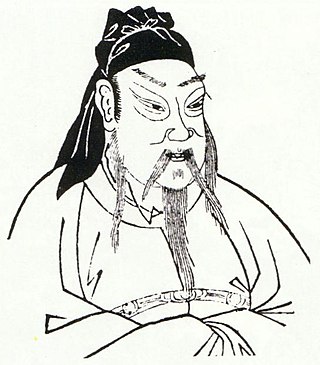
Guan Yu, courtesy name Yunchang, was a Chinese military general serving under the warlord Liu Bei during the late Eastern Han dynasty of China. Along with Zhang Fei, he shared a brotherly relationship with Liu Bei and accompanied him on most of his early exploits. Guan Yu played a significant role in the events leading up to the end of the Han dynasty and the establishment of Liu Bei's state of Shu Han during the Three Kingdoms period. While he is remembered for his loyalty towards Liu Bei, he is also known for repaying Cao Cao's kindness by slaying Yan Liang, a general under Cao Cao's rival Yuan Shao, at the Battle of Boma. After Liu Bei gained control of Yi Province in 214, Guan Yu remained in Jing Province to govern and defend the area for about seven years. In 219, while he was away fighting Cao Cao's forces at the Battle of Fancheng, Liu Bei's ally Sun Quan broke the Sun–Liu alliance and sent his general Lü Meng to conquer Liu Bei's territories in Jing Province. By the time Guan Yu found out about the loss of Jing Province after his defeat at Fancheng, it was too late. He was subsequently captured in an ambush by Sun Quan's forces and executed.
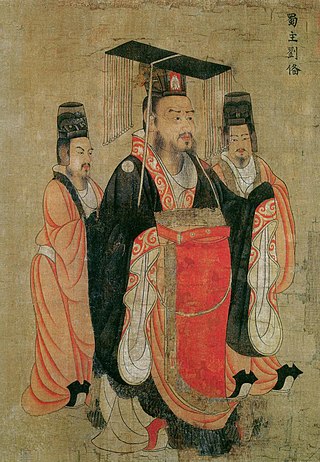
Liu Bei, courtesy name Xuande (玄德), was a Chinese warlord in the late Eastern Han dynasty who later became the founding emperor of Shu Han, one of the Three Kingdoms of China. Although he was a distant relative of the Han imperial family, Liu Bei's father died when he was a child and left his family impoverished. To help his mother, he sold shoes and straw mats. When he reached the age of fifteen, his mother sent him to study under Lu Zhi. In his youth, Liu Bei was known as ambitious and charismatic. He gathered a militia army to fight the Yellow Turbans. Liu Bei fought bravely in many battles and grew famous for his exploits. Later, he participated in the coalition against Dong Zhuo, following this joined his childhood friend Gongsun Zan and fought under him against Yuan Shao.

Xu Huang, courtesy name Gongming, was a Chinese military general serving under the warlord Cao Cao in the late Eastern Han dynasty of China. He later served in the state of Cao Wei during the Three Kingdoms period under the first two rulers, Cao Pi and Cao Rui, before his death at the start of Cao Rui's reign. Xu Huang is best noted for breaking the siege at the Battle of Fancheng in 219 by routing the enemy commander Guan Yu on the field.

Zhang Fei, courtesy name Yide, was a Chinese military general and politician serving under the warlord Liu Bei in the late Eastern Han dynasty and early Three Kingdoms period of China. Zhang Fei and Guan Yu, who were among the earliest to join Liu Bei, shared a brotherly relationship with their lord and accompanied him on most of his early exploits. Zhang Fei fought in various battles on Liu Bei's side, including the Red Cliffs campaign (208–209), takeover of Yi Province (212–214), and Hanzhong Campaign (217–218). He was assassinated by his subordinates in 221 after serving for only a few months in the state of Shu Han, which was founded by Liu Bei earlier that year.

Huang Zhong, courtesy name Hansheng, was a Chinese military general serving under the warlord Liu Bei during the late Eastern Han dynasty of China. He is best known for his victory at the Battle of Mount Dingjun in 219, in which his force routed that of an enemy general, Xiahou Yuan, who was killed in action during the raid.
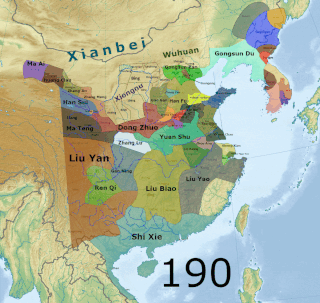
The military history of the Three Kingdoms period encompasses roughly a century's worth of prolonged warfare and disorder in Chinese history. After the assassination of General-in-chief He Jin in September 189, the administrative structures of the Han government became increasingly irrelevant. By the time of death of Cao Cao, the most successful warlord of North China, in 220, the Han empire was divided between the three rival states of Cao Wei, Shu Han and Eastern Wu. Due to the ensuing turmoil, the competing powers of the Three Kingdoms era found no shortage of willing recruits for their armies, although press-ganging as well as forcible enlistment of prisoners from defeated armies still occurred. Following four centuries of rule under the Han dynasty, the Three Kingdoms brought about a new era of conflict in China that shifted institutions in favor of a more permanent and selective system of military recruitment. This ultimately included the creation of a hereditary military class as well as increasing reliance on non-Chinese cavalry forces and the end of universal conscription.

Yue Jin, courtesy name Wenqian, was a military general serving under the warlord Cao Cao in the late Eastern Han dynasty of China. He was noted as much for his short stature as for his valour and ferocity on the battlefield. Yue Jin participated in most of Cao Cao's early military exploits, and gained multiple successes in the campaigns against Lü Bu, Liu Bei, remnants of the Yellow Turban rebels, and Yuan Shao and his associates. He was particularly praised as a capable vanguard, but his most famed accomplishment came with his supporting role in the defence of Hefei against Sun Quan's forces at the Battle of Xiaoyao Ford of 214–215.
Lü Fan, courtesy name Ziheng, was a Chinese military general and politician serving under the warlord Sun Quan during the late Eastern Han dynasty of China. He continued serving in the state of Eastern Wu during the early Three Kingdoms period.
Li Dian, courtesy name Mancheng, was a Chinese military general and politician serving under the warlord Cao Cao during the late Eastern Han dynasty of China. He participated in the Battle of Guandu in 200 between Cao Cao and Yuan Shao. He also played a significant role in the defence of Hefei during the Battle of Xiaoyao Ford of 214–215 against the forces of Sun Quan.
Mi Fang, courtesy name Zifang, was a Chinese military general and politician serving under the warlord Liu Bei in the late Eastern Han dynasty. He was also the younger brother of Mi Zhu, who also served Liu Bei. In 219, Mi Fang surrendered to Liu Bei's ally-turned rival Sun Quan, directly resulting in the loss of Jing Province and the death of Guan Yu. The Australian Sinologist Rafe de Crespigny notes that Mi Fang had the remarkable record of serving each of the leaders of the Three Kingdoms during his lifetime.
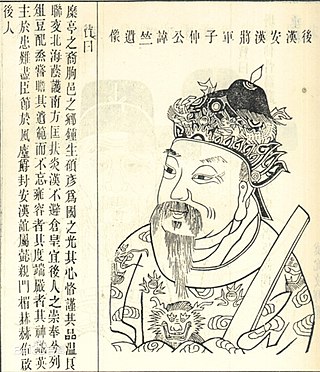
Mi Zhu, courtesy name Zizhong, was a Chinese military general and politician who served under the warlord Liu Bei in the late Eastern Han dynasty, during the Three Kingdoms period, after Liu Bei founded the state of Shu Han. He was also Liu Bei's brother-in-law, as his sister, Lady Mi, married Liu Bei. Mi Zhu was essential to Liu Bei during the defeats of the latter, financing Liu Bei's army in critical times where there was no tax base. Mi Zhu was extremely well educated and helped Liu Bei develop relationships with wealthy rivals such as Yuan Shao, Yuan Shu and Liu Biao. He was also the elder brother of Mi Fang, who served Liu Bei as well until his defection to Liu Bei's ally-turned-rival Sun Quan in 220. Mi Zhu served Liu Bei loyally for more than 25 years, as a high civil official of Liu during all the later's tenures as governor of Xu, Jing and Yi provinces, the former's ideas were regularly and widely circulated to the common people which greatly helped Liu Bei's political movement as Han loyalist and Confucian but, historians would argue it mere rhetoric as Liu ruled more in the tradition of legalism. Nonetheless, Mi along with Jian Yong, Sun Qian, and later Yi Ji, greatly contributed to the Liu's populist movement to restore the Han dynasty through literature and essays. Mi Zhu was thought to be Liu's best friend and most favored subject, he died of illness a little over a year after Liu Bei declared himself emperor.

Kessen II is a strategy game loosely based on the Three Kingdoms period of China. It is the sequel to Kessen in name only; both Kessen and the later sequel Kessen III are based on events in Japan and China. The gameplay involves playing out major battles as the storyline progresses, with cutscenes between each battle for the development of the events and major characters. Before battle, players are given a choice of strategies to take, although they can manually control all units in the battlefield. All units are controlled by the AI unless the player directly intervenes, and battles between forces are carried out in real-time. While in control of a unit, players are able to use special skills or magic spells to turn the tables, although enemy characters are also able to do so.
Yi Ji, courtesy name Jibo, was a Chinese diplomat and politician serving in the state of Shu Han during the Three Kingdoms period of China. He previously served under the warlord Liu Biao in the late Eastern Han dynasty before coming to serve Liu Bei, the founding emperor of Shu Han. Yi Ji was known as an excellent debater and helped write the Shu Ke (蜀科), the legal code of Shu, along with Zhuge Liang, Fa Zheng, Li Yan and Liu Ba.

Romance of the Three Kingdoms is a Chinese television series adapted from the classical 14th century novel of the same title by Luo Guanzhong. The series was produced by China Central Television (CCTV) and was first aired on the network in 1994. It spanned a total of 84 episodes, each approximately 45 minutes long. One of the most expensive television series produced at the time, the project was completed over four years and involved over 400,000 cast and crew members, including divisions of the People's Liberation Army from the Beijing, Nanjing and Chengdu military regions. Some of the dialogues spoken by characters were adapted directly from the novel. Extensive battle scenes, such as the battles of Guandu, Red Cliffs and Xiaoting, were also live-acted.

The Campaign against Dong Zhuo was a punitive expedition initiated by a coalition of regional officials and warlords against the warlord Dong Zhuo in 190 in the late Eastern Han dynasty. The members of the coalition claimed that Dong had the intention of usurping the throne by holding Emperor Xian hostage and by establishing a strong influence in the imperial court. They justified their campaign as to remove Dong from power. The campaign led to the evacuation of the capital Luoyang and the shifting of the imperial court to Chang'an. It was a prelude to the end of the Han dynasty and, subsequently, the Three Kingdoms period.

Three Kingdoms is a 2010 Chinese television series based on the events in the late Eastern Han dynasty and the Three Kingdoms period. The plot is adapted from the 14th century historical novel Romance of the Three Kingdoms and other stories about the Three Kingdoms period. Directed by Gao Xixi, the series had a budget of over 160 million RMB and took five years of pre-production work. Shooting of the series commenced in October 2008, and it was released in China in May 2010.
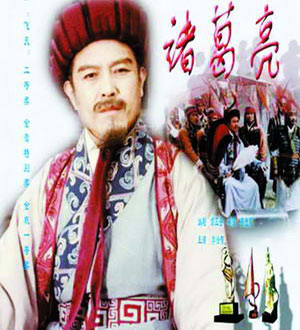
Zhuge Liang is a Chinese television series based on the life of Zhuge Liang, a chancellor of the state of Shu Han in the Three Kingdoms period. The plot is based on stories about Zhuge Liang in the 14th-century historical novel Romance of the Three Kingdoms. The series starred Li Fazeng as the title character and was first aired on Hubei TV in mainland China in 1985. The show has been applauded for its historically accurate sets and costumes.














